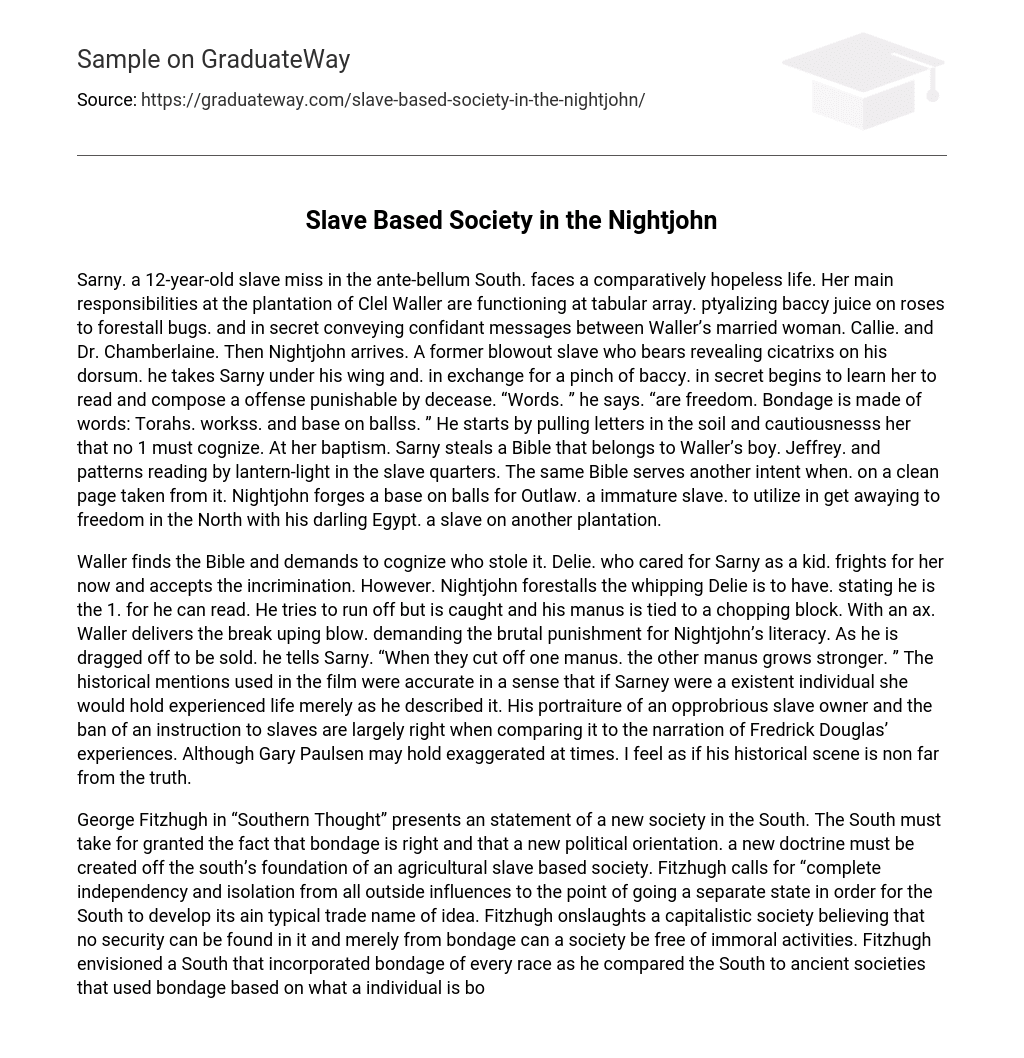Sarny. a 12-year-old slave miss in the ante-bellum South. faces a comparatively hopeless life. Her main responsibilities at the plantation of Clel Waller are functioning at tabular array. ptyalizing baccy juice on roses to forestall bugs. and in secret conveying confidant messages between Waller’s married woman. Callie. and Dr. Chamberlaine. Then Nightjohn arrives. A former blowout slave who bears revealing cicatrixs on his dorsum. he takes Sarny under his wing and. in exchange for a pinch of baccy. in secret begins to learn her to read and compose a offense punishable by decease. “Words. ” he says. “are freedom. Bondage is made of words: Torahs. workss. and base on ballss. ” He starts by pulling letters in the soil and cautiousnesss her that no 1 must cognize. At her baptism. Sarny steals a Bible that belongs to Waller’s boy. Jeffrey. and patterns reading by lantern-light in the slave quarters. The same Bible serves another intent when. on a clean page taken from it. Nightjohn forges a base on balls for Outlaw. a immature slave. to utilize in get awaying to freedom in the North with his darling Egypt. a slave on another plantation.
Waller finds the Bible and demands to cognize who stole it. Delie. who cared for Sarny as a kid. frights for her now and accepts the incrimination. However. Nightjohn forestalls the whipping Delie is to have. stating he is the 1. for he can read. He tries to run off but is caught and his manus is tied to a chopping block. With an ax. Waller delivers the break uping blow. demanding the brutal punishment for Nightjohn’s literacy. As he is dragged off to be sold. he tells Sarny. “When they cut off one manus. the other manus grows stronger. ” The historical mentions used in the film were accurate in a sense that if Sarney were a existent individual she would hold experienced life merely as he described it. His portraiture of an opprobrious slave owner and the ban of an instruction to slaves are largely right when comparing it to the narration of Fredrick Douglas’ experiences. Although Gary Paulsen may hold exaggerated at times. I feel as if his historical scene is non far from the truth.
George Fitzhugh in “Southern Thought” presents an statement of a new society in the South. The South must take for granted the fact that bondage is right and that a new political orientation. a new doctrine must be created off the south’s foundation of an agricultural slave based society. Fitzhugh calls for “complete independency and isolation from all outside influences to the point of going a separate state in order for the South to develop its ain typical trade name of idea. Fitzhugh onslaughts a capitalistic society believing that no security can be found in it and merely from bondage can a society be free of immoral activities. Fitzhugh envisioned a South that incorporated bondage of every race as he compared the South to ancient societies that used bondage based on what a individual is born into. Fitzhugh believed the demand for the South to diversify her economic system from an agricultural one to an industrial one to progress the South’s economic system and instruction. Fitzhugh sought to turn out historically the failure of a free capitalistic society. but when we turn to measure Fitzhugh’s review we discover. at both its explicit and its ramified degree that its strengths are besides are its failings.
Harriet Tubman was an Afro-american emancipationist. human-centered. and Union undercover agent during the American Civil War. After get awaying from bondage. into which she was born. she made 13 missions to deliver more than 70 slaves utilizing the web of antislavery militants and safe houses known as the Underground Railroad. She subsequently helped John Brown recruit work forces for his foray on Harpers Ferry. and in the post-war epoch struggled for women’s right to vote. If the film were a book back in the 1850s. Harriet Tubman would hold been more inspired by the book because it was about how slaves were larning how to read and spell words. On the other manus. she would hold been disgusted with how the slave would hold been treated on the plantation.
Harriet Elizabeth Beecher Stowe is an American author and reformist. best known as the writer of the anti-slavery fresh Uncle Tom’s Cabin. The sensationally popular novel presented an empathic portrayal of slave life and played a important function in breeding moral resistance to slavery prior to the eruption of the American Civil War. Stowe wrote the work in reaction to the Fugitive Slave Act of 1850. which made it illegal to help an at large slave. In the book. she expresses her moral indignation at the establishment of bondage and its destructive effects on both races and particularly on maternal bonds. If the film were made into a book in the 1850s. Harriet Elizabeth Beecher Stowe would hold thought the book was true because her household knows how slaves were really treated.





